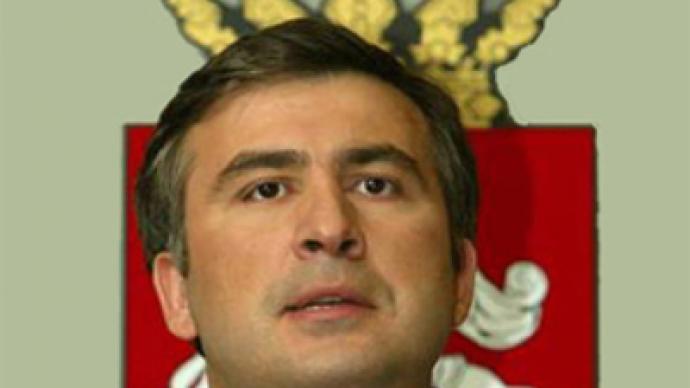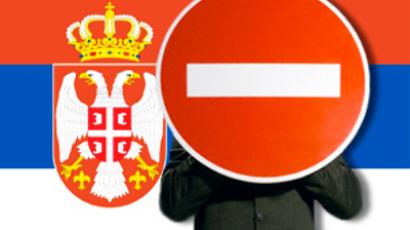Is Georgian President Mikhail Saakashvili only pretending to be nuts?

Georgia’s first provocation against Russia came on the eve of the Olympic Games; the latest on the eve of NATO games. Now, Russians are anticipating what gift to expect from Tbilisi on New Years Eve.
Since the moment Mikhail Saakashvili became Georgia’s president in January 2004, he has been singularly obsessed, like some sort of modern-day Napoleon Bonaparte, with one grandiose idea: expanding his Caucasian fiefdom irrespective of the cost at home and abroad.
Just months after being sworn into office, Saakashvili’s campaign of lebensraum enjoyed early success when his troops seized control of the Ajarian Autonomous Republic, a small coastal region.
After splashing around on the beach in Ajaria following the bloodless takeover, Saakashvili told the assembled crowd, “This paves the way for Georgia’s prosperity… It will be the beginning of Georgia’s territorial integrity.”
Historians, however, and more than one psychiatrist, could cite a long list of other wannabe world conquerors who were seduced by delusions of grandeur after gobbling up a little foreign real estate before going on to menace their peaceful neighbors. Unfortunately for Russia, this proved to be the clinical case with Mr. Saakashvili.
In August 2004, and still in a triumphant mood after his Ajaria beach-storming, the Georgian president fired a wild shot across Russia’s bow by threatening the 7,000 Russian tourists who annually vacation in the breakaway region of Abkhazia.
“I earlier ordered,” said the Georgian Nappy, “that we should immediately open fire on, and sink, every ship [cruise ships included] that enters Abkhazia.”
Can anybody recall the last time a world leader, no matter how ideologically agitated or mentally unhinged, ordered his troops to deliberately target boats carrying innocent tourists? In some places of the world, this is called piracy. I fail to recall even Iranian President Mahmoud Ahmadinejad saying anything so incredible, and he has said some really incredible things. Why, even the Mexicans tolerate chubby Americans wading around in their hotel pools and nude beaches, and the Mexicans lost a lot of real estate in the past to Uncle Sam.
Yes, Mr. Saakashvili, the English-speaking Columbia grad who rode the wave of the Rose Revolution on a surfboard paid for courtesy of the American philanthropist and political meddler, George Soros, specifically told Russian tourists to “pay attention” to his words.
Well, I’m not sure if Russian tourists paid much heed to the alarming caveat, it’s hard to keep Russian tourists away from most places these days, but the Russian authorities certainly did.
“Russian citizens have the right to choose where they want to go on holiday,” the Russian Foreign Ministry said in a statement.
“Any attempts to threaten the lives of Russian citizens will receive the necessary rebuff.”
At this point, Moscow’s unofficial medical diagnosis of the Georgian president’s general state of mind, to roughly translate the Russian saying, was one horse shy of a full troika.
Full blown crazy crackers?
As previously mentioned, Saakashvili’s foreign policy was built on the wobbly foundation of achieving two goals: gaining control of South Osseta and Abkhazia, two territories that have historically remained de facto autonomous regions, with their own unique histories, cultures and languages, despite being absorbed into the Russian empire, and later, the Soviet Union.
History finally came to a boiling head in 1991-92 during the Georgian-South Ossetian conflict. After spilling a river of blood that witnessed thousands of refugees fleeing the region from all sides, a Moscow-brokered ceasefire was imposed. The deal saw Russian peacekeepers stationed on the active fault line between the two hostile camps.
The fragile peace was shattered during the night of August 7-8, 2008, on the very eve of the Olympic Games in Beijing, when Georgia launched a large-scale attack on Tskhinvali, the capital of South Ossetia, killing hundreds of citizens, as well as 12 Russian peacekeepers. Georgian forces were eventually repelled, and over the course of the 5-day war, the Russian offensive advanced deep inside of Georgian territory. The entire world was on the edge of its seat, not knowing to what extent Russia would “punish” Tbilisi.
But as wild as things were getting on the ground in Georgia, the really crazy war was happening on television screens across the world, with an assortment of talking heads blaming Russia for the conflict. But thankfully, the world also got to see a side of the Georgian president that many had not seen before. After all, there are some personality traits that are a bit difficult to censor.
In the heat of the battle around Gori, one of the Georgian towns seized by Russian troops, Mr. Saakashvili was filmed stepping from a vehicle, where it appeared he was going to give an interview with some reporters. Suddenly, apparently overcome with fear at the sight and sound of an imaginary Russian aircraft overhead, Saakashvili made a rather comical dash for cover around a building, with his gun-toting security team – and news cameras – in hot pursuit. They wrestled the president to the ground amidst loud screams and shouts, bundled him back into the vehicle, and sped off.
Okay, perhaps we could give Mr. Saakashvili the benefit of the doubt on this one. I mean, after all, war is no picnic, of course, and who wouldn’t get a little freaked out at the thought of an enemy fighter jet aiming its big guns at you in the middle of an interview?
But this next one is a bit more difficult to explain as the act of a person in full control of his mental faculties. After a ceasefire was announced between Georgian and Russian troops, BBC, which was preparing to run an interview with the president (who probably got more television coverage in his 5-day Ossetian war than Winston Churchill got in his four-year European war), caught Saakashvili unawares as he was nervously munching away on a perfectly good necktie, eyes shifting side to side, while chatting on the telephone.
But even with the ugly dog days of war in the rearview mirror, Saakashvili continues to behave extremely irrational whenever Russia is concerned.
On Tuesday, for example, 500 members of a tank battalion stationed at Georgia’s Mukhrovani base, which lies 30 kilometers (19 miles) east of the capital, mutinied by announcing that they would refuse to participate in operations to break up political protests being held by the opposition. After arresting the soldiers, and putting out rewards for the leaders who escaped, the Georgian Interior Ministry said it had uncovered a Russian-financed plan to topple Saakashvili’s already tenuous hold on power.
So now Russia is accused of commandeering Georgia’s own army! What next?
Apparently, even Saakashvili understood how absurd was the allegation and the Georgian authorities quickly changed the story, saying that the mutiny was aimed at disrupting NATO exercises.
Incidentally, the Georgian opposition, of which there is a growing number, believes Saakashvili staged the failed military coup “to discredit the opposition,” said Irakly Batiashvili, a former Georgian state security minister and now an opposition leader, as reported by Interfax.
Stop the presses! This just in hot off the wires: Saakashvili on Wednesday reportedly told a meeting with his Joints Chief of Staff that Georgian counterintelligence agents arrested a spy at the Georgian diplomatic mission to NATO in Brussels on charges of passing “information on the stationing of Georgian troops to the enemy during the August war last year.” The presumed "super-spy" was allegedly paid just 3,000 euros for passing the top secret information to Russia.
Is it possible that such information would be given away at such a discount? Furthermore, if Russia never heard of Google Maps, it certainly has its own highly developed satellite technology.
During last year’s Valdai conference, which brings together western journalists and top-ranking Russian politicians, Russian President Dmitry Medvedev asked a very pertinent question that needs repeating now:
“Does NATO need such a leader?”













